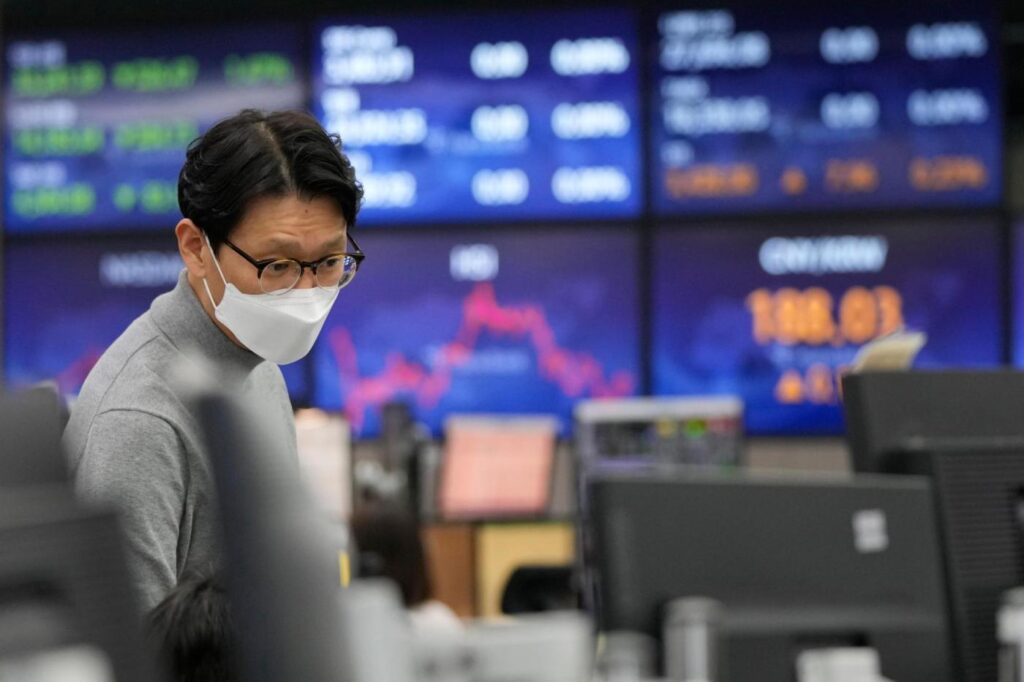
By The Associated Press
NEW YORK (AP) — U.S. markets Friday are drifting toward a lower open Friday, following the previous day’s sell-off on new data showing that inflation in the U.S. jumped to levels not seen since the early 1980s.
Future contracts for the Dow Jones Industrials and S&P 500 both slid 0.2% in premarket trading, but they had recovered from more significant drops earlier Friday.
Benchmarks fell in London, Paris and Hong Kong. Markets in Japan were closed for a holiday.
Price pressures suggest the Federal Reserve and other central banks may need to move faster in raising interest rates to tamp down inflation.
The S&P 500 sank 1.8% Thursday on the report inflation was the hottest since 1982. Bond yields jumped as traders bet the Fed may have to apply the brakes to the economy with a bigger-than-usual hike in interest rates next month. The yield on the 10-year Treasury topped 2% for the first time since August 2019, according to Tradeweb.
Also Thursday, the Dow Jones Industrial Average fell 1.5% and the Nasdaq composite slid 2.1%. The Russell 2000 small cap index dropped 1.6%.
Other economies also are feeling the heat of sharp price increases, with some central banks already moving to raise interest rates. Others are holding off — central banks in Thailand, Indonesia and India opted this week to keep their benchmark rates unchanged.
Meanwhile, some countries in Asia, such as China and Japan, are contending with both higher prices and slow growth and some are still entangled in coronavirus outbreaks that are clouding the outlook for their recoveries from the pandemic.
Germany’s DAX lost 0.3% while the CAC 40 in Paris gave up 1.1%. Britain’s FTSE 100 fell 0.7%.
In Asia, Hong Kong’s Hang Seng slipped 0.1% to 24,906.66, while in Sydney, the S&P/ASX 200 lost 1% to 7,217.30. The Kospi in Seoul dropped 0.9% to 2,747.71. Shanghai gave up early gains, sinking 0.7% to 3,462.95.
India’s Sensex lost 1.4% to 58,113.40.
Trading has been volatile this year as investors puzzle over how quickly and by how much the Fed will raise interest rates to tame surging inflation. The benchmark S&P 500 has fallen three out of the last five weeks and is now 6.1% below the all-time high it set Jan. 3.
Inflation has been building as the economy roared back from the pandemic. Supply shortages and snags in global supply chains also pushed inflation higher, and prices at the consumer level were up 7.5% last month from a year earlier.
The strong jobs market and high inflation have forced the Federal Reserve to begin removing the massive aid it’s poured into financial markets throughout the pandemic. Raising interest rates could help rein in inflation, but would also put downward pressure on all kinds of investments, from stocks to cryptocurrencies.
In the bond market, yields jumped most for shorter-term Treasurys. The two-year yield leaped to 1.62% on Thursday from 1.36% the day before. That rate tends to track expectations for what the Fed will do.
The 10-year yield was just over 2% Friday, down from 2.05% late Thursday.
In other trading, U.S. benchmark crude oil gained $1.28 to $91.16 per barrel in electronic trading on the New York Mercantile Exchange. It picked up 22 cents to $89.88 per barrel on Thursday.
Brent crude, the price basis for international oils, added $1.10 cents to $92.51 per barrel.
The dollar fell to 115.94 Japanese yen from 116.02. The euro slipped to $1.1406 from $1.1430.
